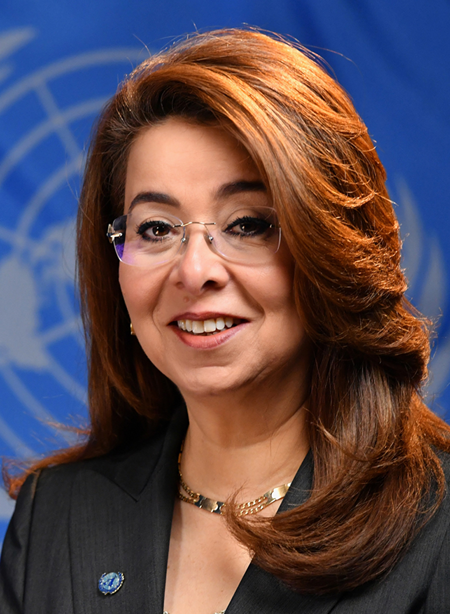No CrossRef data available.
Published online by Cambridge University Press: 31 March 2023

Ghada Waly is the Director-General of the United Nations Office at Vienna and the Executive Director of the United Nations Office on Drugs and Crime. She holds the rank of Undersecretary-General of the United Nations. She previously served as Minister of Social Solidarity of Egypt and chaired the Executive Council of Arab Ministers of Social Affairs. She has also served as Assistant Resident Representative at the United Nations Development Program. Ms Waly holds an MA and a BA in humanities from Colorado State University.
The advice, opinions and statements contained in this article are those of the author/s and do not necessarily reflect the views of the ICRC. The ICRC does not necessarily represent or endorse the accuracy or reliability of any advice, opinion, statement or other information provided in this article.
1 Single Convention on Narcotic Drugs (as amended by the 1972 Protocol), 976 UNTS 105, 30 March 1961 (amended 8 August 1975); Convention on Psychotropic Substances, 1019 UNTS 179, 21 February 1971 (entered into force 16 August 1976); UN Convention against Illicit Traffic in Narcotic Drugs and Psychotropic Substances, 1582 UNTS 95, 20 December 1988 (entered into force 11 November 1990).
2 UN Convention against Transnational Organized Crime, 2225 UNTS 209, 15 November 2000 (entered into force 29 September 2003).
3 2237 UNTS 319, 2241 UNTS 507, 2326 UNTS 208.
4 UN Convention against Corruption, 2349 UNTS 41, 31 October 2003 (entered into force 14 December 2005).
5 See the SDGs website, available at: https://sdgs.un.org/goals (all internet references were accessed in January 2023).
6 UNODC, World Drug Report 2022, June 2022, p. 66, available at: www.unodc.org/res/wdr2022/MS/WDR22_Booklet_2.pdf.
7 UNODC, The Time Is Now: Addressing the Gender Dimensions of Corruption, 2020, available at: www.unodc.org/documents/corruption/Publications/2020/THE_TIME_IS_NOW_2020_12_08.pdf.
8 Ibid., p. 99.
9 UNODC, Global Report on Trafficking in Persons 2022, January 2023, pp. 25, 33, available at: www.unodc.org/documents/data-and-analysis/glotip/2022/GLOTiP_2022_web.pdf.
10 UNODC, Successful Strategies for Addressing the use of Technology to Facilitate Trafficking in Persons and to Prevent and Investigate Trafficking in Persons, background paper prepared by the Secretariat, 23 July 2021, available at: www.unodc.org/documents/treaties/WG_TiP_2021/CTOC_COP_WG.4_2021_2/ctoc_cop_wg.4_2021_2_E.pdf.
11 UNODC, Countering Trafficking in Persons in Conflict Situations, thematic paper, 2018, available at: www.unodc.org/res/e4j/data/_university_uni_/countering_trafficking_in_persons_in_conflict_situations_html/17-08776_ebook-Countering_Trafficking_in_Persons_in_Conflict_Situations.pdf.
12 Children and Armed Conflict: Report of the Secretary-General, UN Doc. A/75/873–S/2021/437, 6 May 2021, available at: https://tinyurl.com/mt5j5zzd.
13 International Cooperation against Terrorism and Links between Terrorism and Other Criminal Activities in the Context of the Work of the United Nations Office on Drugs and Crime, UN Doc. A/CONF.203/5, working paper prepared by the Secretariat, 11th UN Congress on Crime Prevention and Criminal Justice, Bangkok, 2005; Makarenko, Tamara, “The Crime–Terror Continuum: Tracing the Interplay between Transnational Organised Crime and Terrorism”, Global Crime, Vol. 6, No. 1, 2004CrossRefGoogle Scholar; Action Taken by Member States and United Nations Entities to Address the Issue of Linkages between Terrorism and Organized Crime: Report of the Secretary-General, UN Doc. S/2020/754, 29 July 2020, paras 4-5, available at: https://documents-dds-ny.un.org/doc/UNDOC/GEN/N20/190/58/PDF/N2019058.pdf?OpenElement. In its Resolution 2482, the UN Security Council emphasized that “the combined presence of terrorism, violent extremism conducive to terrorism, and organized crime … may exacerbate conflicts in affected regions and may contribute to undermining affected States”, noting also that “organized criminal groups and terrorists benefiting from organized crime” can “complicate conflict prevention and resolution efforts”. UNSC Res. 2482, 19 July 2019, Preamble.
14 Action Taken by Member States, above note 13.
15 UNODC, above note 9, p. 52.
16 Protocol to Prevent, Suppress and Punish Trafficking in Persons, Especially Women and Children, 2237 UNTS 319, 12 December 2000 (entered into force 25 December 2003) (Trafficking in Persons Protocol), Art. 14.
17 Ibid.; Convention relating to the Status of Refugees, 189 UNTS 137, 28 July 1951 (entered into force 22 April 1954); Protocol relating to the Status of Refugees, 606 UNTS 267, 31 January 1967 (entered into force 4 October 1967).
18 UNODC, UNODC Strategic Vision for Africa 2030, available at: www.unodc.org/unodc/en/strategy/africa-vision.html; UNODC, UNODC Strategic Vision for Latin America and the Caribbean 2022–2025, available at: www.unodc.org/res/strategy/STRATEGIC_VISION_LATIN_AMERICA_AND_THE_CARIBBEAN_2022_2025_ENE17_EDsigned.pdf.
19 UNODC, UNODC Strategy 2021–2025, available at: www.unodc.org/unodc/strategy/index.html.
20 UNTOC CoP Res. 10/6, 2020, available at: www.unodc.org/documents/treaties/UNTOC/COP/SESSION_10/Resolutions/Resolution_10_6_-_English.pdf.